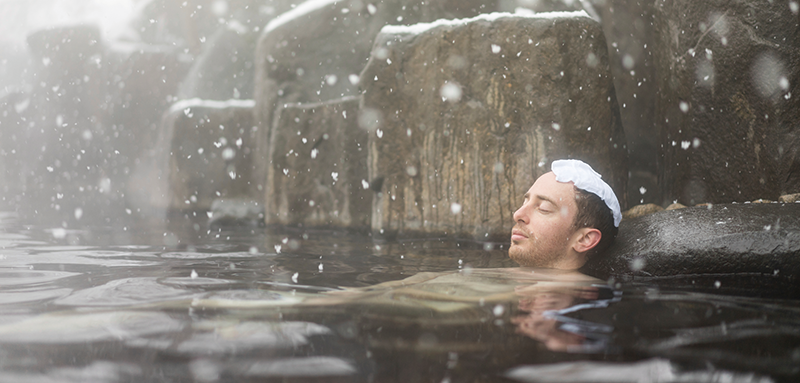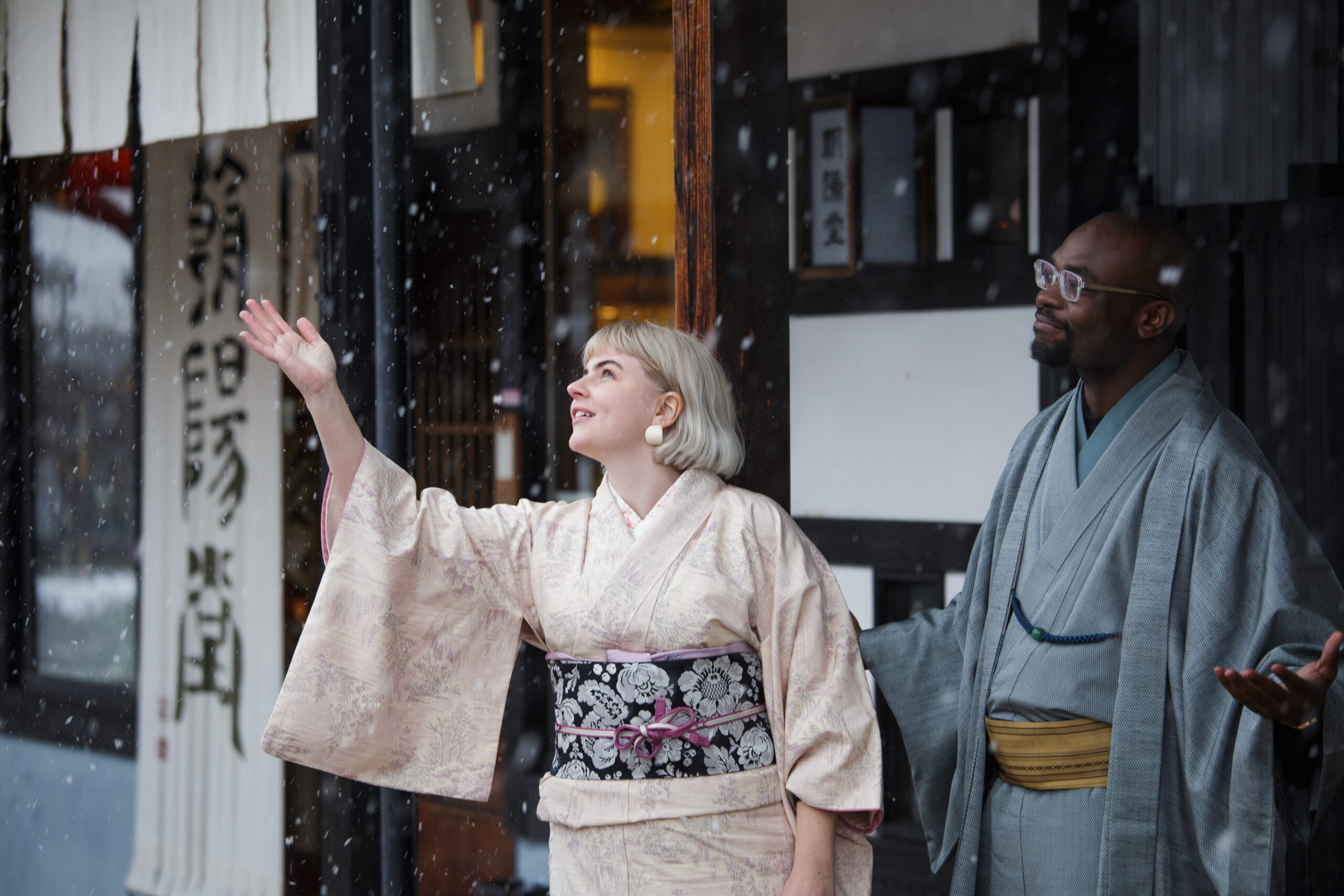By Matt Klampert
In a previous article, we discussed the recognized health benefits of natural therapies like visiting an onsen. These sort of remedies are a far cry from modern Western medicine, but they are still being used today by people in order to maintain their physical and mental health. Likewise, for those who have had their fill of the hot spring and want to experience something new, the YUKIGUNI area is also home to a licensed forest therapy base in the town of Tsunan.
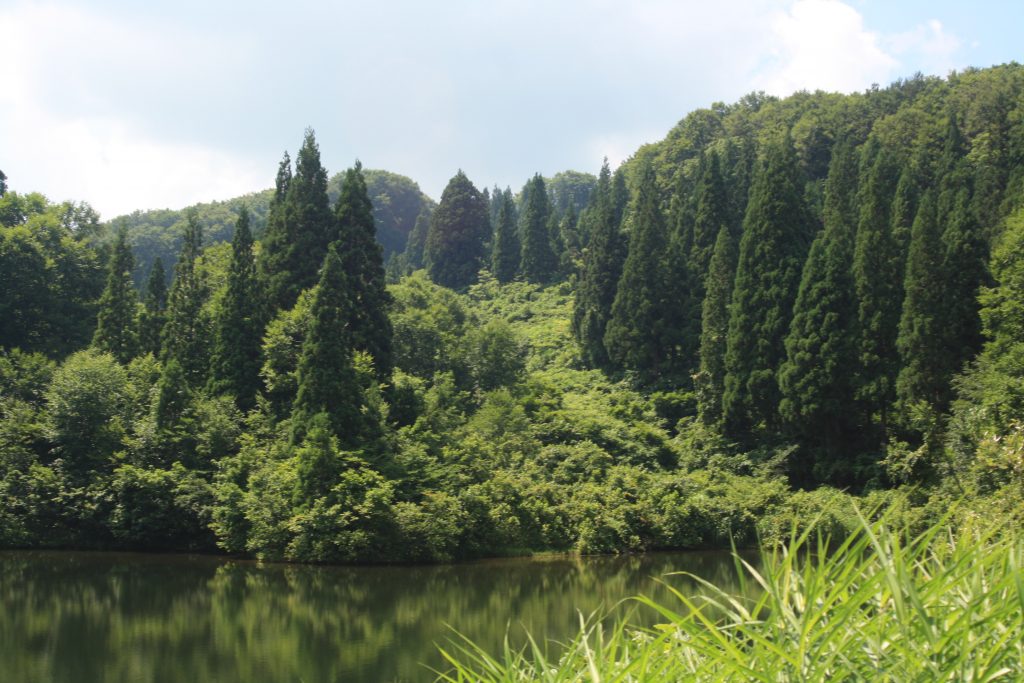
A brief history of forest therapy in Japan
Shinrin-yoku, or “forest bathing,” as it’s sometimes known, has a long history in Japan. The concept was actually created as a result of a government initiative back in the 1980s. During this time, when the country was very prosperous economically, people began seriously considering the rise of various illnesses that could be exacerbated by constant stress. Forest bathing was introduced as a form of preventative medicine to try to not only decrease the burden of medical costs on the government, but also to help people in a quickly urbanizing society. Since then, 62 licensed forest therapy bases have popped up across the country, with the concept also spreading to America, Finland and other countries worldwide.
Taruda Mountain Park is the name of the forest therapy base within YUKIGUNI, however calling it a park may seem a little misleading. One of the reasons this region was chosen to be a forest therapy site in the first place is because of its very lack of amenities: no tennis courts, restaurants, or ice cream is available here. What you have instead is a few park benches, solar-powered bathroom facilities, and some of the most beautiful pristine forest imaginable. I went together with licensed forest therapy guide Masayuki Okamura. As the Mountain Park is far into the mountains and people unfamiliar with Tsunan may not know the way, we recommend that you start your journey at the town hall instead. First, the staff will take your resting heart rate and blood pressure, which you will take again at the end. From there it is about another 20 minute drive deep into the mountains to get to Taruda.
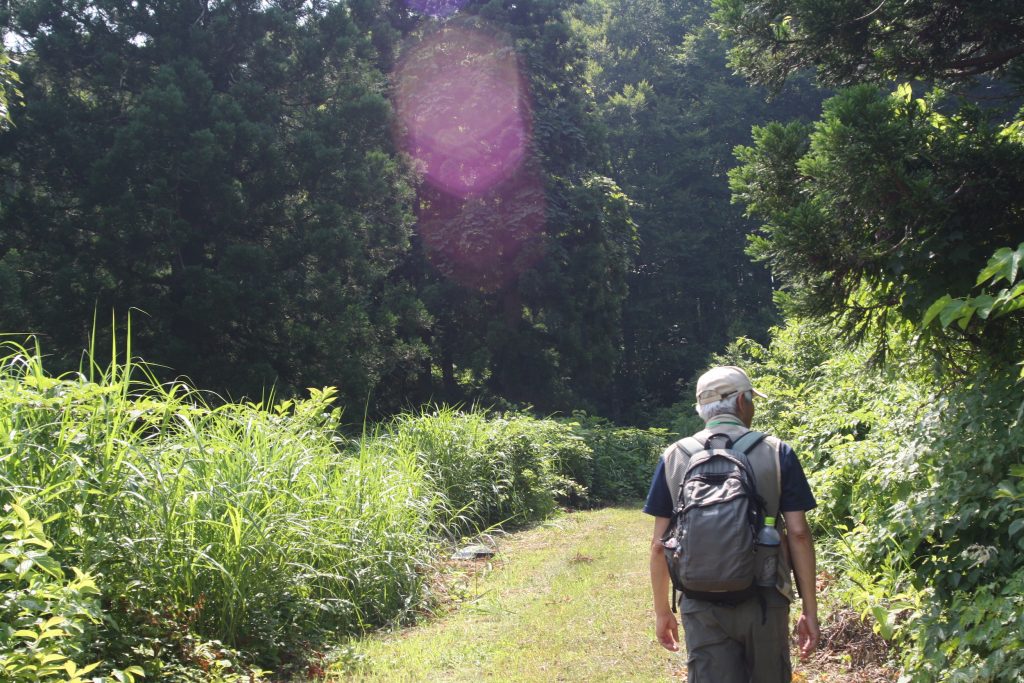
Along the trail
On the day of our forest therapy experience, we took the Jonobi Course, which is about 2.5 km of leisurely trail that can be completed in approximately an hour. So, what makes the Jonobi Course, or any other forest therapy course, special? This is not any simple hike up a mountain. For one thing, it is usually far easier; this is because the benefits of forest therapy have little to do with physical exertion. Rather, the most important thing is the overall journey as experienced through our five senses. This is because many of us spend too much time relying on our vision throughout the day, such as endless hours spent staring at a computer or smartphone. Not only does this make our eyes tired, but it deadens our other senses. Part of forest bathing is the ability to open oneself up to the use of all our senses in a relaxed atmosphere.
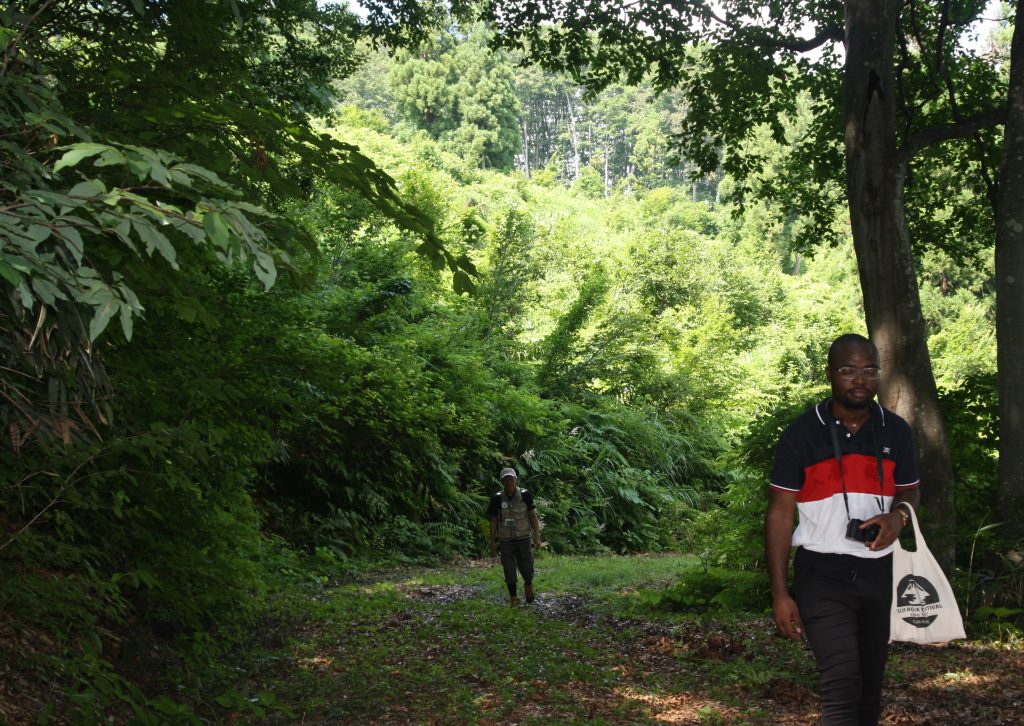
Sounds of the forest
From the outset at Taruda Mountain Park, you can hear the sounds of nature in perfect clarity, which we have recorded below for your listening pleasure. Of note is the fact that you cannot hear any cars or airplanes buzzing by, or people for that matter. Here, peace and quiet are key for the healing to begin, and the other people we met along the way were quiet and respectful.

Stop and smell the roses
When you do forest therapy, the phrase “stop and smell the flowers,” should be taken literally. Part of having respect for nature is learning about your surroundings. Like many Japanese forests, the pleasant aroma of cedar can be smelled everywhere, but that’s not all. Our guide showed us some mugwort, or yomogi, which is important in the area as a primary ingredient of the local sweet called kusadango. We also smelled some lindera, or kuromoji. Since the start of the pandemic, people sometimes pick kuromoji to put inside their mask to enjoy the relaxing scent throughout the day. It is also sometimes used in tea. Though we didn’t do so on this journey, it is recommended to enjoy some tea made with local plants while on your forest therapy hike.
The smells of the local plants were wonderful and refreshing, but what was even more surprising were the things we were invited to taste along the way. For example, a leaf known as Hiki-Okoshi is an herb used in traditional Japanese medicine, usually given to revive someone who has fainted. There were also a variety of fruits growing, such as akebia, and wild mushrooms. Though it is not required per se, one of the main reasons why we recommend you do your first forest therapy session with a licensed guide is for their expert guidance on what can be eaten safely, as certain vegetation may be poisonous. However, a healthy “detox bento” can be purchased beforehand, and some of the local ryokan in the area make meals from produce local to the region.
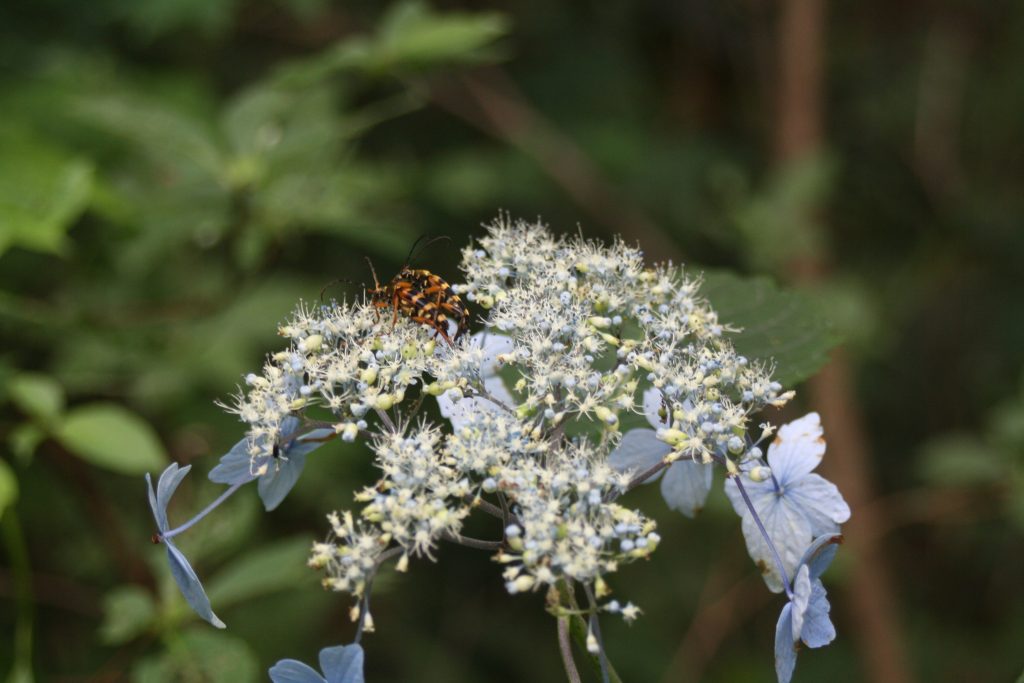
Inside a living forest at YUKIGUNI
As you can see, the forests of Taruda were full of life. Besides all manner of birds and insects, it is also not uncommon to find the occasional tanuki or kamoshika wandering the forests. Despite the signs warning of bears in the area, our guide was not worried about an attack in that part of the mountains. All the same, it’s always best to bring your trusty bear bell just in case. A characteristic of this forest in particular is the large amount of beech, or buna trees. These are considered to be the official tree of YUKIGUNI, because of the tree’s association with snow. A characteristic of buna trees in these parts is their large leaves- the result of heavy rainfall- as well as their twisted trunks. As these trees age and mature, they are covered by heavy snow each winter, which causes them to bend before straightening out again. As an additional part of our forest therapy course, we bonded and hugged one of these trees, to truly get a sense of them. The trees provide heavy forest cover, which means the trails are kept relatively clear as not much can grow with so little sunlight. It also helps to keep the forest path cool during humid Japanese summers. A lot goes into this delicate ecosystem, and there are few places like it.
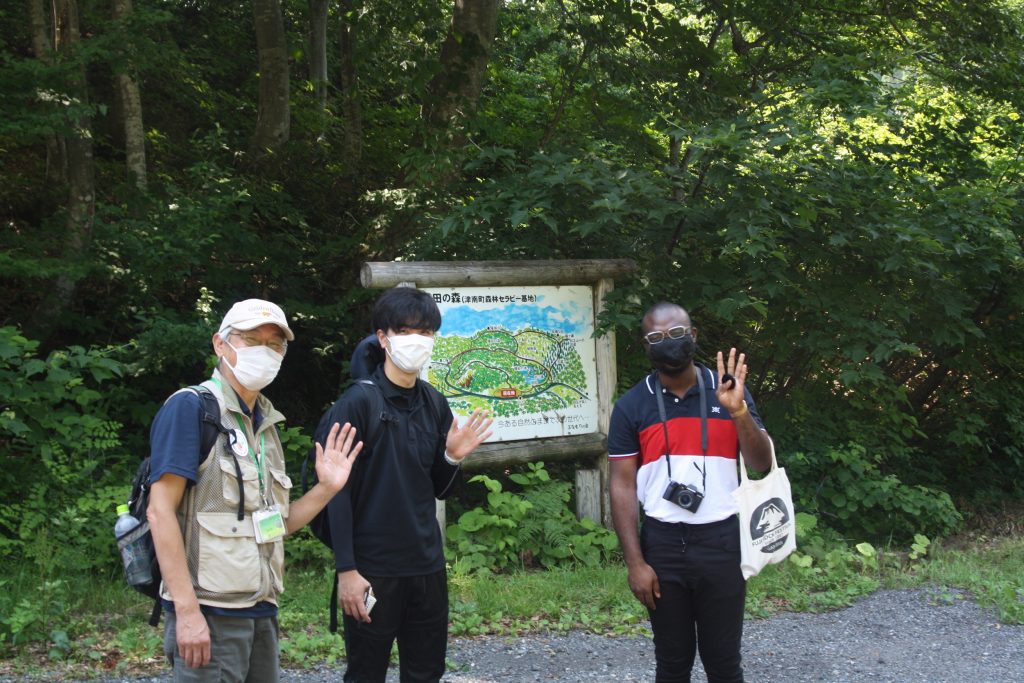
Ask the Expert: Masayuki Okamura
Lastly, I had some time to chat with Mr. Okamura about the region, and how he came to be a forest therapy guide here. Originally born and raised in Tsunan, he left the town, only to come back 20 years later. “I assumed that the reason I loved Tsunan was simply because it was my hometown; but it wasn’t until I had been away for a while that I really came to appreciate this place.” He also is one of the nine or so licensed forest therapy guides in Tsunan. He first became interested in it when he realized that there was real evidence to back up forest therapy’s health claims. “I had always heard about the concept of ‘forest bathing,’ and I was interested in how it had proven health benefits,” he said. Even when he is not on the job giving tours and sharing his knowledge, he likes to return to the forests for his own benefit. He remarked to me that Tsunan never really changes, and hasn’t really been touched by commercialization and over-tourism, which is truly part of its charm. As for how often you should do forest therapy, some studies recommend about two hours every week, however Mr. Okamura recommends just going whenever you feel worn out. “People may see this area as simple and unsophisticated, but when you think about it, that is also the charm of this place. Just as there are all sorts of people, people can get all sorts of different benefits from coming here, I think.”
Information for Travelers
Please contact the local forest therapy association for more details and to schedule your own guided tour:
URL: https://bunamori.info/
Tel: 025-765-5585
Access:
From Tokyo 70 minutes from Shiozawa-Ishiuchi IC on R353 & R117
From Niigata 90 minutes from Echigo Kawaguchi IC on R117
Tourism Tsunan
Tsunan Town Tourism Area Development Department DMO Promotion Office
585 Shimofunatobo, Tsunan, Nakauonuma, Niigata prefecture, 〒949-8292

